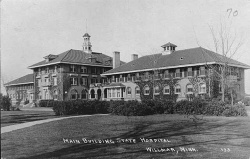Difference between revisions of "Willmar State Hospital"
Evilavatar (talk | contribs) (→History) |
|||
| Line 48: | Line 48: | ||
</gallery> | </gallery> | ||
| + | ==Cemetery== | ||
| + | The Willmar State Hospital Cemetery, now known as Oak Knoll Cemetery, was opened in December of 1926. The cemetery was divided into an area primarily for those of the Catholic (194) faith and the balance for Protestant (675) faith in general. The cemetery itself was expanded in about 1962 for the third addition. | ||
| + | |||
| + | [[Category:Minnesota]] | ||
[[Category:Active Institution]] | [[Category:Active Institution]] | ||
[[Category:Cottage Plan]] | [[Category:Cottage Plan]] | ||
| − | [[Category: | + | [[Category:Institution With A Cemetery]] |
Revision as of 21:57, 31 January 2012
| Willmar State Hospital | |
|---|---|
 | |
| Construction Began | 1912 |
| Current Status | Active |
| Building Style | Cottage Plan |
| Peak Patient Population | 1,483 |
| Alternate Names |
|
History
Built on an open farm field north of town, the Willmar Hospital Farm for Inebriates opened in 1912 with just 37 patients. Their treatment included working on the self sustaining farm where oats, barley, corn, timothy, vegetables and livestock where raised. During the hospital’s first 18 months, 84 inmates escaped, which “did little to alleviate the skepticism and stigma that had surrounded the new institution from the beginning.”
In March of 1917, the hospital was renamed the Willmar State Asylum and “so-called hopeless or custodial care cases” who were destined to become lifelong wards of the state” were housed at the facility.
From 1919 through the early 1930s, buildings were added to the campus in a steady schedule of new construction in an attempt to keep pace with the increasing population. New cottages for men and women, an administration building and auditorium were built. Mentally-ill patients arrived in rail coaches from other hospitals in Minnesota, increasing the population to 1,471.
In 1937 the name was changed to Willmar State Hospital. During and after World War Two, shortages of staff and money resulted in deteriorating conditions at the hospital. Reports said patients were “forgotten people” who were “crowded like animals” and slept in “dingy attics.”
Improvements were made, and in the 1950s, doctors at the Willmar State Hospital developed a “holistic approach” to treating alcohol addiction that was later called the “Minnesota Model.”
During that time, the hospital had a population of 1,483 and employed about 320 staff. A movie called “the Human Side” that addressed the nature and treatment of mental illness, was filmed primarily at the Willmar State Hospital and had a premier showing in Willmar on July 11, 1957, with Gov. Orville Freeman in attendance. A crowd of 1500 people attended the showing of the film, which received the Silver Award from the American Psychiatric Association.
By 1962, community mental health centers were opening in Minnesota and the population at the Willmar State Hospital shrank to 851. In 1969 the livestock and farm equipment at the hospital was sold and farm buildings were demolished.
In 1985, the hospital was given a new name,the Willmar Regional Treatment Center. In 2002, plans were initiated to close it. Today, most of the sprawling campus is owned by a private conglomerate of companies called Minn-West Technology that bought the site as part of a collaborative effort to save and reuse the buildings. Adolescent treatment programs are still done at one of the original cottages and outpatient services are provided at several offsite facilities. 360 degree images of the campus on the grounds of the hospital can be found on the Minn-West Tech site here [1].
Images
Cemetery
The Willmar State Hospital Cemetery, now known as Oak Knoll Cemetery, was opened in December of 1926. The cemetery was divided into an area primarily for those of the Catholic (194) faith and the balance for Protestant (675) faith in general. The cemetery itself was expanded in about 1962 for the third addition.


